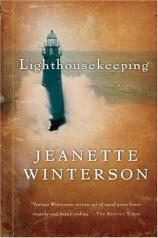Lighthousekeeping
Review
Lighthousekeeping
When thoughtful, quiet Silver's mother dies, the girl must rely on the kindness of strangers, no easy thing to find in the rugged coastal town of Salts. The only one who will have pity on her is blind Mr. Pew, the keeper of the lighthouse perched at Cape Wrath.
Soon enough, Silver has settled into life at the lighthouse, caring for the aging man and listening to his stories. For, it turns out, there's much more to tending a lighthouse than simply keeping the light burning, at least according to Pew. Pew tells Silver that in order to keep the light, she must learn all his stories, "The ones I know and the ones I don't know." When Silver asks how she can possibly do such a thing, Pew advises her to tell them herself.
It will be a long time before Silver can tell her own stories, but in the meantime she is awash in the stories of Mr. Pew, in particular the stories of the mysterious preacher Josiah Dark, a long-ago resident of Salts, and his dark dual life, which served as the inspiration for Robert Louis Stevenson, himself a former resident of Salts.
Caught up in Dark's story, threatened with the automation of the Cape Wrath light, and ready for Silver to take up his mantle, Pew disappears, leaving Silver to follow him and start to construct her own stories. Soon she has found her own life, her own love, and her own voice that she can use to tell stories to the one she loves.
Like Jeanette Winterson's previous novels, LIGHTHOUSEKEEPING is both startlingly lyrical and deeply literary. Containing allusions to Darwin, Greek mythology, the story of Tristan and Isolde, the novels of E. M. Forster and Virginia Woolf, and even Winterson's own earlier work, LIGHTHOUSEKEEPING offers numerous rewards to readers familiar with her literary sources.
That is not to say, though, that LIGHTHOUSEKEEPING cannot be enjoyed on its own merits. Its language, particularly in its meditations on love, verges on poetry: "The world is nothing. Love formed it. The world vanishes without trace. What is left is love." Winterson's small, deceptively simple novel is actually quite challenging, as she plays with narrative structures and narrative voices, resulting in a work that can be enjoyed by many different readers on endlessly different levels.
Reviewed by Norah Piehl on December 30, 2010
Lighthousekeeping
- Publication Date: April 3, 2006
- Genres: Fiction
- Paperback: 232 pages
- Publisher: Harvest Books
- ISBN-10: 0156032899
- ISBN-13: 9780156032896









